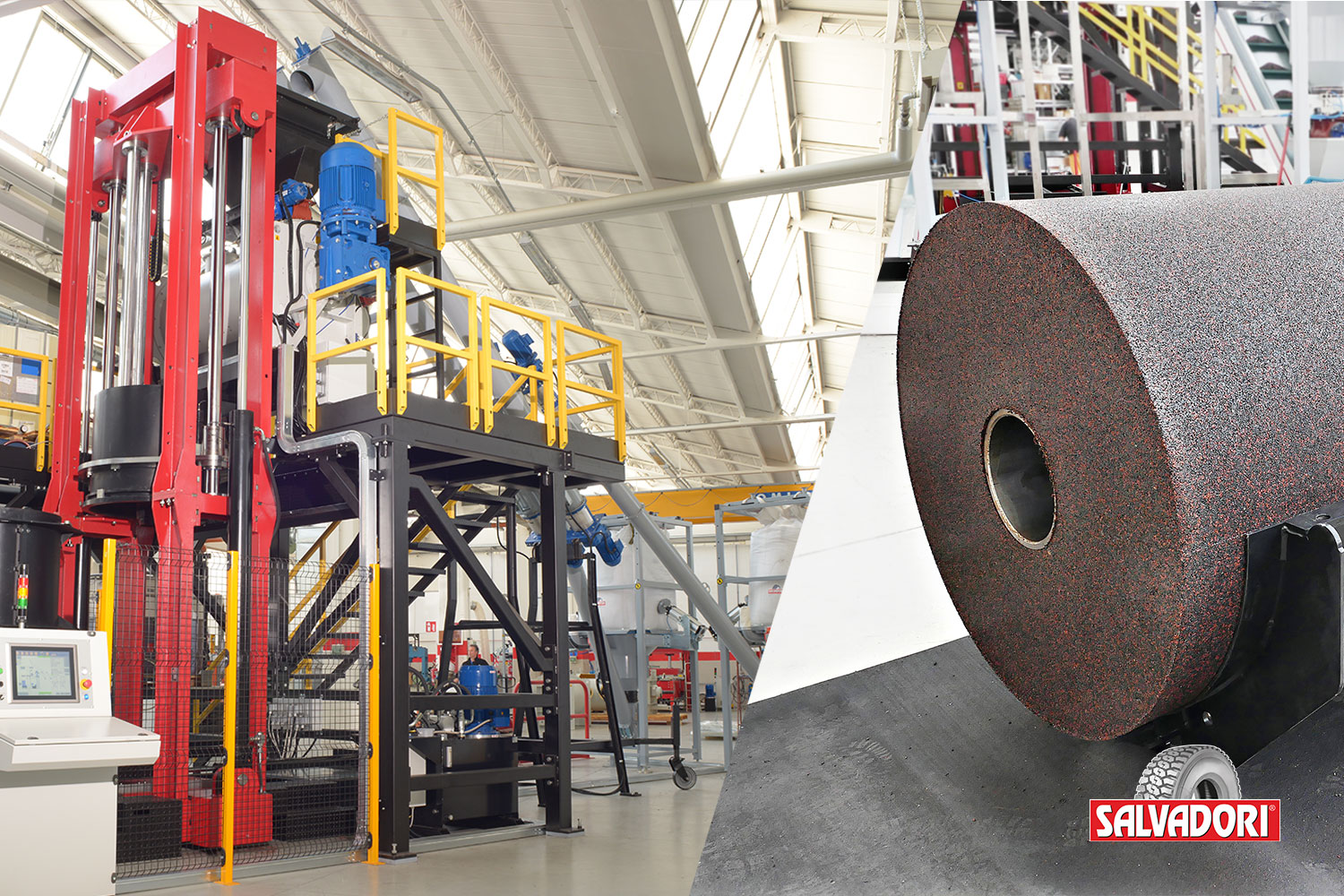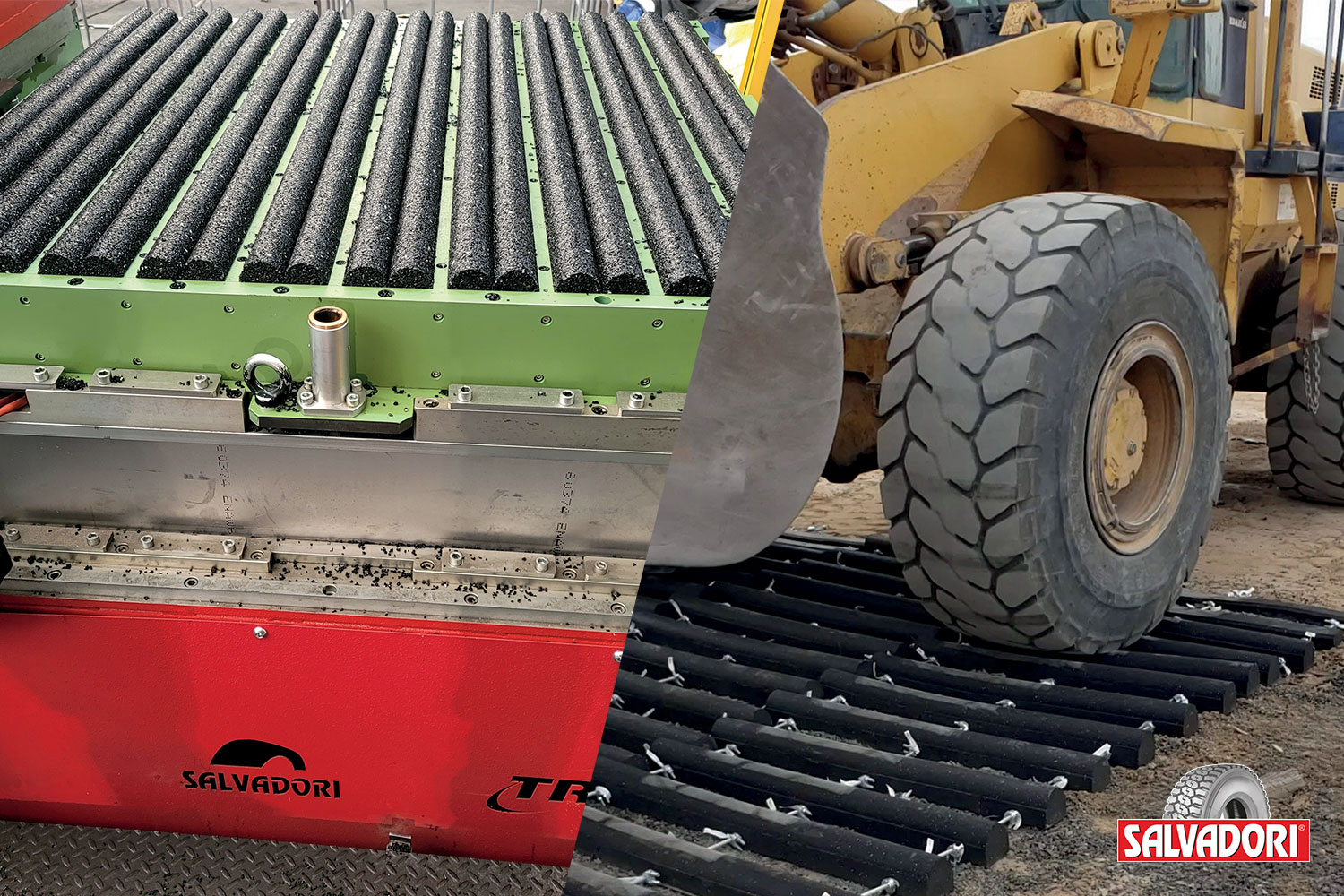Old tyres are a valuable resource, as rubber retains its positive material properties when recycled. This opens up many opportunities for processing end-of-life tyres (ELT), not least because specialized engineering companies are enabling ever more efficient production processes for tyre recycling and processing in the form of rubber granulate. As a result, the spectrum of sustainable products made in this process is growing.
Quantities and processing of old tyres
The world produces huge quantities of old tyres every year. These are referred to as end-of-life tyres (ELT). A December 2019 report on global ELT management estimates that the EU and 13 other countries produced a total of 29.1 million t of ELT (fig. 1). The report also states that 26.1 million t of old tyres were reclaimed, with a high proportion being processed for energy or materials.
The European Tyre & Rubber Manufacturers Association (ETRMA) also publishes data on the utilization of old tyres. It estimates that in 2018, a total of 3.26 million t of ELT were reclaimed in 32 countries (EU 28, Norway, Serbia, Switzerland and Turkey). In the same year, EU member states approved measures to strengthen the waste hierarchy and place greater emphasis on waste reduction, reuse and recycling. These measures focus primarily on granting a second life to old tyres through retreading. If this is not possible, the next step is to reclaim the composite materials of the tyre and use these secondary materials to create sustainable products in a circular economy. The measures seek to avoid incineration of old tyres, i.e. energy recovery, as much as possible to preserve resources. In 2018, around 1.25 million t of ELT were incinerated. Recycling accounts for 62 % of old tyres or around 2 million t. This trend looks set to continue in future.
Recycled rubber – a valuable secondary material
What makes ELT so interesting for recycling is the high proportion of natural and synthetic rubber it contains. Rubber is perfectly suited for recycling, as it retains its positive properties. Secondary products, produced from rubber granulate and binders, often also have a longer service life than the primary product – the tyres. The following list details just some of the products that can be made from recycled rubber granulate using cutting-edge production technology:
-
-
- Covers and wall systems for protecting people, animals and objects
- Noise insulation in walls
- Fall protection flooring, e.g. on play-grounds
- Floor systems for animal stalls
- Impact sound insulation
- Anti-slip mats, e.g. for load securing
-
In some countries, businesses that recycle ELT can benefit from state support.
From scrap tyres to valuable material
The most valuable sources of tyre rubber are so-called supersize tyres of the kind used on mining vehicles. These often weigh several tonnes and measure over 4 m in diameter. It is their sheer size that makes these tyres so suitable for recycling, alongside car and truck tyres. But these huge tyres first need to be shredded before they can be recycled. Salvadori produces hydraulic cutters to reduce the volume of these tyres, along with equipment for re-moving the steel beading inside (fig. 2). Both process steps make the subsequent re-cycling of the supersize tyres much easier.
In this purely mechanical process, the tyres or parts thereof are cut in several steps until the metal components inside can be magnetically separated. The rubber chips undergo further fine granulation, while the textile components are removed by a vacuum. At the end of the process, all components are fully separated from each other. The resulting rubber granulate can then be provided in various qualities and grain sizes for further processing, according to individual customer requirements.
From rubber granulate to the semi-finished product
Rubber granulate can be pressed together in further production steps with added binders to form large blocks or cylinders (fig. 3-5). These can then be turned into sustainable end products easily and efficiently, for example using the splitting ma-chines from Fecken-Kirfel. Before compression, it is possible to mix up to four different materials (e.g. SBR or EPDM in various grain sizes). This results in a wide range of potential products. It is therefore possible to influence the properties of the end product (density, hardness, elasticity, colour, etc.), resulting in a broad field of applications.
From block and cylinder to a sustainable product
Once a block or cylinder is produced, how does it become a product with defined properties, quickly and efficiently, and in the right thickness and/or with special pro-filing? Fecken-Kirfel specializes in tailored machinery and systems for cutting and splitting. Blocks can be turned into wall systems, impact sound insulation, sound insulation mats, fall safety mats and anti-slip mats. The automated H 24 G band knife splitting machine is suited for splitting blocks into the required thickness (fig. 6). With its reinforced design, it is capable of accurately splitting even heavy materials with a density of up to 1,100 kg/m3 and a hardness of up to 70 Shore A, depending on the material properties. In processing, these rubber granulate blocks usually measure up to 300 mm in height. Depending on the material, grain size, distribution and binder quality, it is possible to split layers measuring 1.5 – 2 mm to up to 30 mm in thickness. The H 24 G is equipped with Windows-based control for simple and intuitive operation. It features a vacuum system that can secure the block to the movable table if required. The cutting program runs automatically according to the required formats and quantities, making it possible for the machine to be operated by just one person. Handling is made easier by the visualization of cutting parameters, along with the ability to incorporate an automatic stacking system. Thanks to its flexibility, productivity and efficiency, the H 24 G is a highly profitable machine for users.
A further processing option is offered by the D 31 profile cutting machine, which expands the potential usages of the rubber granulate (fig. 7). Profile cutting makes it possible to give the material certain additional properties. Profiled mats made from permeable rubber granulate, for example, enable fluid drainage. These are therefore often used in ani-mal stalls to provide warm, safe, dry and comfortable flooring for horses and cattle. This is just one example of the potential end product applications that make the D 31 an interesting option as a pure pro-file cutting machine. Profile cutting is possible for soft materials with a density of 500 – 800 kg/m³. The profile depth is generally between 5 mm and 10 mm. Automatically readjusting band-knives ensure compliance with tight tolerances, along with a cast iron construction and specially formed highly robust band-knife beams. The machine can also be combined with rolling systems.
The compact K 31 band knife splitting machine represents a lower-cost alternative for splitting rubber granulate blocks. The K 31/D 31 combined splitting and profile cutting machine offers additional processing flexibility. It makes it possible to use the same machine for profile cutting sim-ply by replacing the feed rollers with profile rollers.
Fecken-Kirfel’s R 24 band knife peeling machine is ideal for producing sheets and foils made from rubber granulate cylinders, which are then used to make sport and lei-sure floorings, for example (fig. 8 – 10). It can be used to peel materials with a density of 500 – 1,100 kg/m3. A special variant, the R 34, is currently under development and will be able to process cylinders weighing up to 7.5 t. It will therefore be particularly well suited to achieving high production capacities. The upper working width limit is 2,000 mm. Depending on the material properties, the potential thickness of the peeled layers ranges from 1.5 – 20 mm. The length of the sheets can be selected in advance, while there is also an optional side trimming system. The R 24 and R 34 both feature a powerful grinding system for the blades. This is important, as rubber granulate can still contain abrasive particles.
Opportunities in a growing market
Technological developments along the entire processing chain for rubber granulate products are unlocking new opportunities:
-
-
- Greater product quality
- Development of new products
- More cost-effective production
- Greater value creation
-
According to the specifications of the EU waste hierarchy, the proportion of recycled old tyres is likely to rise further. The outstanding material properties of recycled rubber makes it an interesting option for many applications, particularly those that call for elasticity, heat retention and sound insulation. Businesses in the rubber industry are already using rubber granulate to produce fall safety panels, flooring, covers, wall systems and much more. Companies like tyre recycling specialist Salvadori and cutting expert Fecken-Kirfel are helping to further optimize these production processes. This leads to greater value creation that makes the sector even more interesting. Sustainable tyre recycling also makes a decisive contribution to preserving resources and protecting the environment.
Contacts:
Fecken-Kirfel GmbH & Co. KG, Aachen, Germany
www.fecken-kirfel.de
Article published on RFP International Magazine for Polymer Industry Volume 16, April 2021 2|2021
PDF Article RFP 02 2021 Page 82-85




